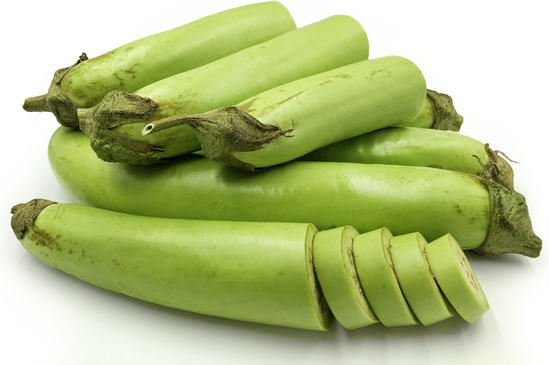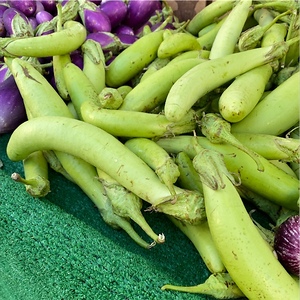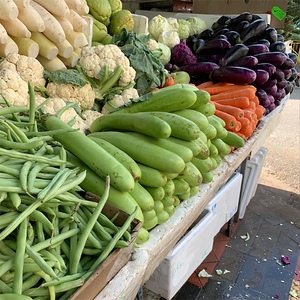


Choryoku Eggplant
Estimated Inventory, lb : 0
Description/Taste
Choryoku eggplants are long and slender, averaging up to 30 centimeters in length. Its outer skin is smooth, glossy, and green. The inner flesh is creamy white and contains a few seeds. Choryoku eggplants are firm and offer a mild and sweet flavor.
Seasons/Availability
Choryoku eggplant is available in the early summer months.
Current Facts
Choryoku eggplant, botanically classified as Solanum melongena var. esculentum 'Choryoku,' is a member of the nightshade family along with tomatoes, potatoes, and peppers. Like many Japanese varieties of eggplant, the Choryoku is sought after for its sweet flavor which offers less bitterness than traditional eggplants. Japanese varieties such as the Choryoku have been historically associated with Southeast-Asian culture and cuisine though they have been gaining in popularity in the United States as more farms have started experimenting with growing different varieties of eggplant.
Nutritional Value
Choryoku eggplants offer some potassium, vitamin E, vitamin B, and carotenes.
Applications
Japanese eggplants such as the Choryoku have fewer seeds than traditional varieties of eggplant, a quality which makes them less bitter in flavor. Their long, thin shape makes them ideal for slicing into rounds which can be baked, fried, broiled, or grilled. The firm texture of the Choryoku eggplant's flesh makes it an ideal meat substitute in vegetarian and vegan preparations. Choryoku pairs well with miso, soy sauce, vinegar, sesame oil, garlic, ginger, fermented beans, mushrooms, onions, and meats such as chicken and pork. Choryoku eggplants will keep up to three days when stored in a cool and dry place.
Ethnic/Cultural Info
In Japan, there is a famous proverb that illustrates the value that the culture holds for the eggplant, "The happiest omen for a New Year is first Mount Fuji, then the falcon, and lastly eggplant." This proverb refers to the dreams that are had in the first three days after the New Year. If an eggplant appears in the dream, it is a sign of good luck and accomplishment for the year to come.
Geography/History
The eggplant dates back to the Old Word and is native to Indo-Burma and China. Cultivation is believed to have first occurred in India where it also is believed to have grown wild in ancient times. Eggplants made their way to Japan during the 8th century during the time of the Tang dynasty. Today Choryoku eggplant can be found at farmers markets and specialty grocers in Asia, Europe, and the United States.
Recipe Ideas
Recipes that include Choryoku Eggplant. One
| China Sichuan Food |
|
Chinese Eggplants with Minced Pork |
| San Diego Foodstuff |
|
Thyme Infused, Steamed Marinated Eggplant |









